From 12:00 to 14:00 on January 10, 2018, renowned international studies scholar Professor Amitav Acharya and renowned historian Niall Ferguson visited the School of International Studies of Peking University, and held a dialogue with teachers and students around the topic of "Where is the International Order Heading?" . This dialogue, jointly organised by the Institute for China-U.S. People-to-People Exchange of Peking University, and the American Studies Centre of Peking University, is the first lecture in High-end Lectures on China-U.S. People-to-people Exchanges in 2018. Professor Wang Dong, Executive Deputy Director of the Institute for China-U.S. People-to-People Exchange of Peking University, served as the host. Professor Zhang Xiaoming, Professor Ding Dou, Associate Professor Liu Haifang, Associate Professor Guo Jie, Associate Professor Chen Shaofeng and Associate Professor Jie Dalei, as well as more than 40 doctoral students and master' s students from the School of International Studies, Yenching Academy and various departments participated in the discussion.
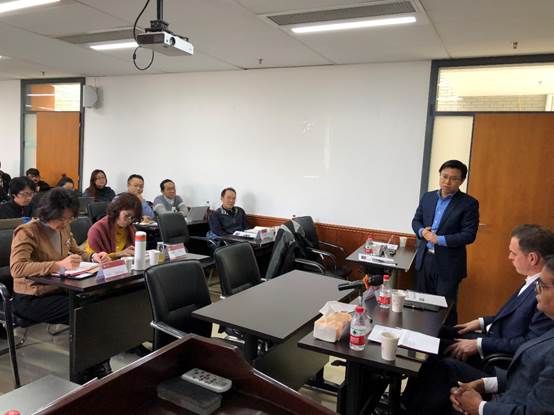
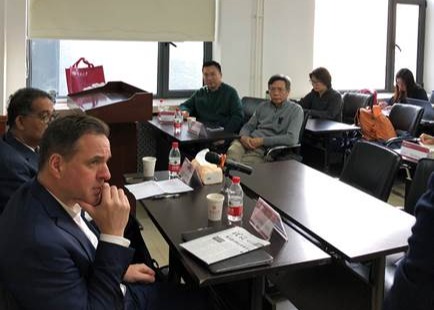
Professor Acharya first explored the concept of the international order. He pointed out that various concepts of order appeared in the history of international relations after the Westphalia system, in which the Liberal Order led by British Empire in the 19th century and the United States in the 20th century approached the concept of the international order. In recent years, the theory of "The End of the American World Order" has been overstated, and the Liberal Order is not a global order. The decline of the Western Liberal Order has a long history, and Trump is not the initiator of evil. The crisis faced by the Liberal Order also comes from internal challenges, not just external; the pillars of the Liberal Order, such as the United Nations system and WTO system, are no longer the same as before. The roles of regional organisations and private sectors have increased significantly, resulting in the fragmentation of the Liberal Order. Non-state actors have also become an important part of the current international system. The emergence of the Trump phenomenon is a result of the decline of the Liberal Order. As President Trump cuts U.S. membership fees to the United Nations and withdraws from important international organisations, the United States has become a disrupter of the international order.
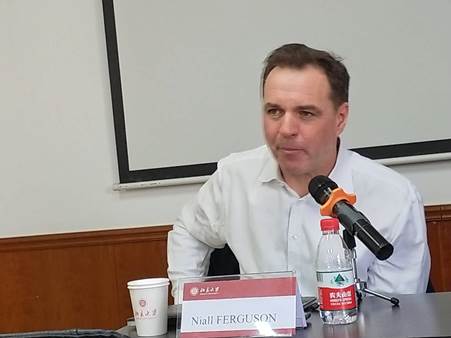
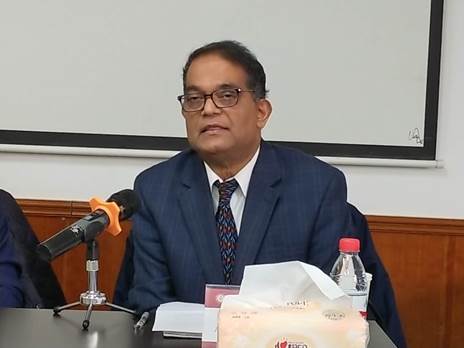
According to Professor Acharya, the Liberal Order will not disappear completely, and some functions will continue, but its universality will be weakened, so other mechanisms and emerging countries will be needed to complement it, and a phenomenon of multiple-actors and multiple-orders will emerge in the future. Rising countries such as China and India benefit from the Liberal Order. Rather than actively undermining the existing order, they will seek to embed new components that align with their own ideas and interests, as exemplified by the Asian Infrastructure Investment Bank and BRICS Development Bank. In his latest book The End of American World Order, Professor Acharya puts forward the concept of the Multiplex World, which holds that both established and rising powers, global and regional entities, and transnational non-state actors will participate. In the future, the world order will be more diversified and decentralised beyond Western centralism.
Professor Ferguson also questioned the existence of the international order, and discussed whether there is a "Liberal Order" from the point of view of history and economic history. He pointed out that the Liberal Order is an idea constructed by political science scholars and media, beginning with the establishment of international organisations such as the United Nations in 1945, but a real Liberal Order never existed. During the Cold War, all countries had to choose sides in the competition between two empires and two ideologies, and Asia, Africa and Latin America were under the intervention of two great empires. Professor Ferguson said in his book that events such as the Korean War, Cuban missile crisis and Vietnam War could trigger world wars, and that the absence of the outbreak of World War III was entirely a blessing. From the perspective of economics, the world economic system is in the control of capitalism, and the Liberal Order is a false superficial phenomenon. High tariffs have been imposed since 1945 in major countries. Despite the discussion of interdependence and capital flow between countries which started in the 1970s, the real-world trade, capital and personnel flows have been on track since the 1990s. Professor Ferguson believes that China and the United States play a key role in globalisation. Citing the concepts of "Chimerica" and the "American Empire" in his monograph, he pointed out that the United States provides important public goods to maintain the system, and money from China helps sustain the United States' economic growth model and enables it to cope with domestic fiscal deficits, with China itself as a beneficiary of the system. In fact, there is a strange marriage and odd couple relationship between China and the United States which has kept this order working well for more than two decades.

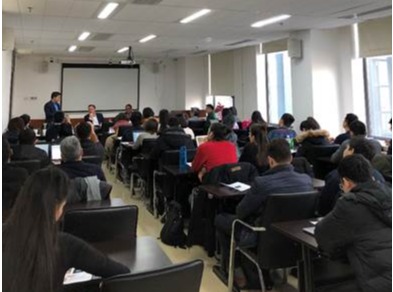
However, the economic crisis in 2008 ended the state of "Chimerica" and the "American Empire", and globalisation had dropped from its peak. According to Professor Ferguson, China and the United States still play a significant role in the post-crisis order. The United States has begun to decline in some aspects, paying more attention to "America First" and putting its allies in second place, while China develops its own power through capital and other forces. However, confined to the conditions of strength, there will be no world order dominated by China. In addition, with the development of networks and science and technology, the international order faces new challenges. Social media is creating a new anarchy, with events such as the American Presidential Election and turmoil in the Middle East presenting potential threats. Based on historical research, Professor Ferguson pointed out that cooperation between great powers plays an irreplaceable role in the international system. The Pentarchy formed in Europe at the Congress of Vienna in the 19th century brought about a century of stability, and the P5 of the United Nations Security Council after 1945 could effectively manage world affairs. Therefore, the present great powers should draw on historical experience and raise the level of institutionalisation of the P5 system. China and the United States share common interests on issues such as combating terrorism, cybercrime, nuclear proliferation, and regulating small countries and non-state organisations in the international system.
At the end of the guests' speeches, Zhang Xiaoming, Ding Dou, Liu Haifang, Guo Jie, Chen Shaofeng and Jie Dalei raised questions relevant to their respective research fields, and conducted in-depth discuss with the guests on the concept of the international order and global order, value and driving force of the international order, relationship between the international order and domestic order, position of developing countries such as African countries, whether current regional mechanisms (such as NATO) will continue, legitimacy of the international order, and populism. The lecture ended in a warm atmosphere.
Guest profiles:
Amitav Acharya: UNESCO Chair in Transnational Challenges and Governance of the School of International Studies, American University, and former President of the International Studies Association. Representative works include The End of American World Order(2016), Whose Ideas Matter? (Cornell, 2009), Rethinking Power, Institutions and Ideas in World Politics (Routledge, 2013), Constructing a Security Community in Southeast Asia: ASEAN and the Problem of Regional Order (2004), etc.
Niall Ferguson: Senior Researcher at the Centre for European Studies of Harvard University, Senior Researcher at Jesus College of the University of Oxford, and Senior Researcher at the Hoover Institution of Stanford University; included among the "100 most influential people in the world" byTime in 2004. Representative works include The Square and the Tower: Networks and Power, from the Freemasons to Facebook (2018), The War of the World: Twentieth-Century Conflict and the Descent of the West (2015), The War of the World (2013), The House of Rothschild (2012), and Empire (2011).
